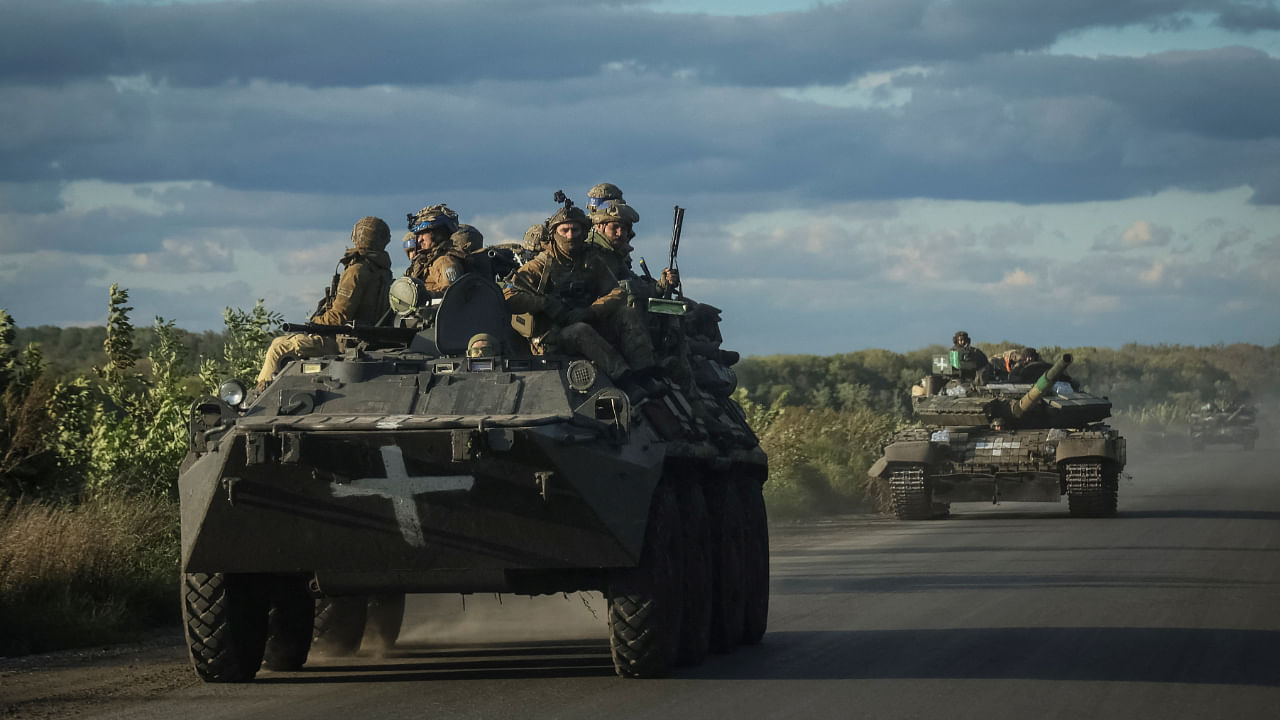
Ukraine said its troops have marched farther east into territory recently abandoned by Russia, paving the way for a potential assault on Moscow's occupation forces in the Donbas region as Kyiv seeks more Western arms.
"The occupiers are clearly in a panic," Ukrainian President Volodymyr Zelenskyy said in a televised address late on Monday, adding that he was now focused on "speed" in liberated areas.
"The speed at which our troops are moving. The speed in restoring normal life," Zelenskyy said.
The Ukrainian leader also hinted he would use a video address to the United Nations General Assembly on Wednesday to call on countries to accelerate weapons and aid deliveries.
"We are doing everything to ensure Ukraine's needs are met at all levels - defence, financial, economic, diplomatic," Zelenskyy said.
Ukraine's armed forces had regained complete control of the village of Bilohorivka, and were preparing to retake all of Luhansk province from Russian occupiers, provincial Governor Serhiy Gaidai said. The village is only 10 km (6 miles) west of Lysychansk city, which fell to the Russians after weeks of grinding battles in July.
"There will be fighting for every centimeter," Gaidai wrote on Telegram. "The enemy is preparing their defence. So we will not simply march in."
Luhansk and the neighbouring province of Donetsk comprise the industrialised eastern region of Donbas, which Moscow says it intends to seize as a primary aim of what it calls the "special military operation" in Ukraine.
Ukrainian troops have begun to push into Luhansk since driving Russian forces out of northeastern Kharkiv province in a lightning counter-offensive this month.
In a sign of nervousness from a Moscow-backed administration in Donbas about the success of Ukraine's recent offensive, its leader called for urgent referendums on the region becoming part of Russia.
Denis Pushilin, head of the Moscow-based separatist administration in Donetsk, called on his fellow separatist leader in Luhansk to combine efforts toward preparing a referendum on joining Russia.
The Ukraine general staff said fighting in the past 24 hours had been limited to the Donetsk region, and Russian attacks had been repelled near Mayorsk, Vesele, Kurdyumivka and Novomykhailivka settlements.
In the south, where another Ukrainian counter-offensive has been making slower progress, Ukraine's armed forces said they had sunk a barge carrying Russian troops and equipment across a river near Nova Kakhovka in the Kherson region.
"Attempts to build a crossing failed to withstand fire from Ukrainian forces and were halted. The barge ... became an addition to the occupiers' submarine force," the military said in a statement on Facebook.
Reuters could not independently verify either side's battlefield reports.
Increased Ukrainian long-range strike capability had likely forced Russia's Black Sea fleet to relocate some of its submarines from the port of Sevastopol in Crimea to Novorossiysk in Krasnodor Krai in southern Russia, the British military said on Tuesday.
Grim graves
Ukraine is still assessing what took place in areas that were under Russian control for months before a rout of Russian troops dramatically changed the dynamic of the war earlier this month.
At a vast makeshift cemetery in woods near the recaptured town of Izium, Ukrainian forensic experts have so far dug up 146 bodies buried without coffins, Kharkiv regional governor Oleh Synehubov said on Monday. Some 450 graves have been found at the site, Zelenskyy has said
Fanning out in groups beneath the trees, workers used shovels to exhume the partially decomposed bodies, some of which locals said had lain in the town streets long after they died before being buried.
The government has not yet said how most of the people died, though officials say dozens were killed in the shelling of an apartment building, and there are signs others were killed by shrapnel.
According to preliminary examinations, four showed signs of torture, with their hands tied behind their backs, or in one case a rope tied round their neck, Serhiy Bolvinov, the head of investigative police in the Kharkiv region, told Reuters at the burial ground.
Bolvinov said the great majority of the bodies appeared to be civilians. Locals have been identifying their dead by matching names to numbers on flimsy wooden crosses marking the graves.
"Soldiers had their hands tied, there were signs of torture on civilians," Bolvinov said. Ukraine says 17 soldiers were in a mass grave at the site.
Reuters could not corroborate Ukraine's allegations of torture.
The Kremlin denied on Monday that Russia was to blame for atrocities that Ukraine says it has uncovered in the recaptured territory.
"It's a lie, and of course we will defend the truth in this story," Kremlin spokesman Dmitry Peskov said, comparing the allegations to incidents earlier in the war where Russia claimed without evidence that atrocities were staged by Ukrainians.
Alarm over nuclear plant
Ukraine accused Russian forces on Monday of shelling near the Pivdennoukrainsk nuclear power plant in the country's southern Mykolaiv region.
A blast occurred 300 metres (yards) away from the reactors and damaged power plant buildings shortly after midnight on Monday, Ukraine's atomic power operator Energoatom said in a statement.
The reactors were not damaged and no staff were hurt, it said, publishing photographs showing a huge crater it said was caused by the blast.
"Russia endangers the whole world. We have to stop it before it's too late," Zelenskyy said in a social media post.
The strikes will add to global concern over the potential for an atomic disaster, already elevated by fighting around another nuclear power plant in the south, Zaporizhzhia, captured by Russian forces in March.